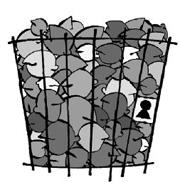I had a terrifying dream the other night: A great, unseen power operated an amusement park. Those who followed instructions pranced along, having a merry time and not noticing anything amiss; those who didn’t conform were separated from the group and, to their surprise, slowly tortured and killed.
The dream was a neat summary of the column I’ve been writing about prisons. Probably the best way to understand the scope, barbarity, and sheer sadism of the unseen, ever-expanding American Gulag is as a nightmare.
America’s increasingly harsh and punitive attitude toward whomever it brands as criminal, particularly in “the War on Drugs,” has led to a stunning growth in incarceration rates. This year, the United States surpassed the 2 million mark in its prison population. That’s more than the entire population of West Virginia; it is a quarter of the world’s entire prison population. Far too few people wonder what the hell a “free” country is doing imprisoning 1 in 130 of its citizens, some 1 in 28 of its blacks.
Even more disturbingly, corporate America has discovered the profitability of locking people up. Directly and indirectly, a jailed population is good for business. Directly, the nationwide growth of private companies that operate prisons for profit—such prisons have opened recently in Montana and Idaho, and the INS contracts out a for-profit detention center in Seattle—means that inmates additionally suffer through lax supervision and “downsized” education and rehabilitation programs. Indirectly, companies have discovered the benefits of prison labor, in which inmates are paid low low wages (much of which they can’t keep), can’t unionize, can’t complain about conditions, and are promptly delivered to work every day. Moreover, America’s prisons are creating an entire class of ex-cons who have that much harder a time afterwards finding jobs that are willing to pay them competitive wages.
“There’s this whole sense from Congress on down that prisoners are somehow less than human and that you can do anything you like behind prison walls,” says Jenni Gainsborough of the DC-based Sentencing Project. The group tracks the excesses of the nation’s prisons: sensory deprivation, stun technology, abuse of solitary confinement, etc. Gainsborough says that Washington state’s prisons are better than most nationally but that the trend, like everywhere else, is steadily and rapidly worsening. Particularly noteworthy, in Washington and elsewhere, is the new trend toward “super-max” prisons—prisons or control units whose harshness has justifiably drawn accusations of torture and inhumane treatment from groups such as Amnesty International and Human Rights Watch. A half-dozen such units are now being built in Washington state.
The outrages seem endless. Prisons are chronically overcrowded; inmates are shuttled from state to state, as prisons— especially private ones—juggle to keep their beds full. Mandatory sentencing keeps inmates in longer; punitive parole boards prevent release even when inmates have served their time well. How does any of this serve society?
During a season in which we heard repeated platitudes about exercising one’s right to vote, we heard nothing about the 4 million current and former prisoners who cannot vote. Disproportionately, the ban on voting—like criminal justice matters in general—falls hardest on minorities, especially African Americans. The number of young African-American men who have been swept up by the law and subsequently lost the right to vote is so extensive it has led some in the African-American community to worry aloud about an intentional campaign to disenfranchise blacks.
These measures serve no defined purpose other than to exact societal revenge for what are often, as in the War on Drugs, “crimes” that hurt no one but the criminal. From any kind of penological standpoint, the measures are counterproductive; sooner or later, most prisoners are going to reenter society, and it simply makes more sense for them to be suitably chastened but to have a job skill and a way to “go straight.” Instead, we are warehousing literally millions of people who rot away, spending 23 or more hours a day in a cage, day after day after day. Unless they are unusually resourceful, they are learning nothing but anger and the tools of various criminal trades from fellow prisoners.
It is a state of affairs the country should be deeply ashamed of; instead, both major presidential candidates touted their love of the death penalty and the War on Drugs, and Washington state had a gubernatorial candidate, John Carlson, who was propelled to political relevance by his tough-on-crime initiatives. Cons and ex-cons, remember, can’t vote. All signs are that locking up as many people as possible, for as long as possible, as harshly as possible, is deeply popular with most Americans. But then, the spectacle of Christians vs. lions at the Roman Colosseum drew sellout crowds.
Good evening, ma’am . . .
On the other hand, not everybody wants to vote. . . . After about the dozenth of those annoying “Don’t forget to vote Nov. 7” phone calls, it occurred to me that anarchists should organize a “get out and don’t vote” phone bank before elections. Some folks would surely think it was a prank, but I’ll bet it would lead to a lot of interesting and revealing conversations. How about it?







